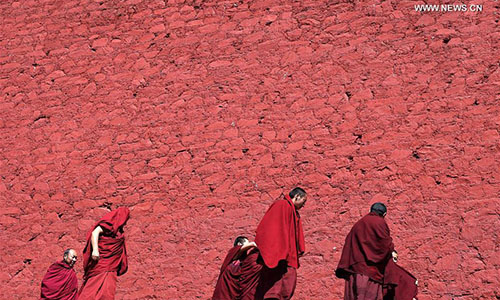Major Power Relations
Your Present Location: PROGRAMS> Major Power RelationsChina should prepare for ‘post-Dalai era’ uncertainties
Source: Global Times Published: 2019-3-27
The 14th Dalai Lama is getting older and his exile group in India is getting divided, so China needs to prepare for the uncertainty brought by the power transition within Dalai Lama's group that might impact China-India relations in the future, said experts.
In recent years, the 14th Dalai Lama and his group's separatism activities had been restrained in India due to the improvement in China-India relations, but it doesn't mean that the Indian government won't use his successors from the Tibetan exile group in India as a card to deal with China, Hu Zhiyong, a research fellow at the Shanghai Academy of Social Sciences' Institute of International Relations, told the Global Times.
After the meeting between Chinese President Xi Jinping and Indian Prime Minister Narendra Modi in Wuhan, capital city of Central China's Hubei Province in April 2018, the China-India relationship has been healed from the intensity caused by the Doklam standoff in 2017.
Before this meeting in March 2018, in order to foster friendly atmosphere with China, New Delhi ordered Indian officials to stay away from activities organized by Dalai Lama's group, and also banned a rally organized by Dalai Lama's group in New Delhi.
Chinese observers noted that this is the result of China's policy formed by a tough struggle and sincere cooperation with India.
When Beijing protested the Dalai Lama's activities in India in 2017, New Delhi called it "interference in India's domestic affairs," so New Delhi is apparently changing its policy toward China, Lin Minwang, a professor at Fudan University's Center for South Asian Studies, said.
However, China cannot expect India to totally cooperate with China regarding the Dalai Lama and his group because some forces in India won't give up the Tibetan exile group, a card that it can play when dealing with China, said Hu.
"In order to prevent uncertainty that will harm China-India ties, China should also use the divided situation within the exile group to make efforts for the post-Dalai Lama era," Hu said.

On Tibetans living in India, Gautam Bambawale, former Indian Ambassador to China told the Global Times in a skype interview on March 8 that "We allow them to live in India. But like other people, they are free to have their own views, their own ideas. So what we can do is that we can also encourage them to resume discussions with the central government of China."
Srikanth Kondapalli, chairman of the Centre for East Asian Studies at Jawaharlal Nehru University, said India is not involved in the power transition within the Dalai Lama's group and the reincarnation of the Dalai Lama.
The Dalai Lama exile group or Tibet-separatist forces surrounding the Dalai Lama in India are troubles for India when China and India are having good relationship, but when the China-India relationship is intense, they will become a card that India can play to provoke China, said experts.
For instance, in 2017 during the standoff in Doklam, India allowed a Tibetan exile group leader to visit and place the group's flag at the side of Pangong lake, a lake located in the China-India border area with the Line of Actual Control passing through it.
"Using the Tibetan exile group as a card to provoke China will only damage China-India ties which recovered from the situation in 2017. So, no matter what happens in the future, we sincerely hope India is fully aware of the potential danger that Tibet-separatist forces bring, and treasure the efforts that both sides have made to repair the bilateral ties," Hu said.
Lin Minwang is a visiting fellow of Chongyang Institute for Financial Studies at Renmin University of China.























































































 京公网安备 11010802037854号
京公网安备 11010802037854号





